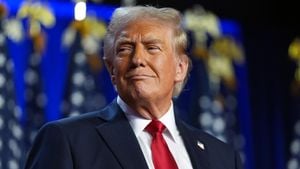World leaders congregated under the Brazilian sun for the highly anticipated G20 Summit, where they intended to tackle pressing global issues ranging from climate change to the rising specter of political populism.
Security was heavily intensified around Rio de Janeiro as politicians and high-ranking officials from various countries arrived. The atmosphere was charged, with discussions expected to revolve around several hot-button issues, including the impact of climate policies on economic growth and the resurgence of populism exemplified by Donald Trump's political comeback.
Climate change has emerged as one of the prominent themes, especially after Brazil's recent history of environmental controversies. Julia dos Santos, Brazil's Environmental Minister, emphasized the country's commitment to end illegal deforestation and bolster global climate initiatives. "This summit offers us an opportunity to reaffirm our dedication to sustainable practices and fight against climate change on every front," she stated.
Meanwhile, Trump's shadow loomed large over the proceedings. His administration's previous withdrawal from the Paris Agreement remains fresh for many, and world leaders are now grappling with how his potential return to the White House could alter the international climate strategy. Senior officials from Europe expressed concern over Trump's stance, with one EU representative noting, "if history repeats itself, we could face setbacks on our climate goals if the U.S. doesn’t hold its commitments. We must seek pathways to collaborate regardless."
The conversations surrounding taxation policies aimed at tackling climate change are also expected to play out. A contingent of leaders proposed implementing taxes on carbon emissions, arguing it's pivotal for both economic and environmental health. These leaders recognized the economic challenges faced by less affluent nations and proposed fostering investment and technology transfer as part of the tax structure. Emeritus economist Darnell Washington cautioned, "We must be careful not to penalize vulnerable economies but rather wish to allow them the means to adapt and thrive through new technologies."
On the political front, the G20 summit is also intertwined with global security issues. With the conflict between Russia and Ukraine showing no sign of resolution, discussions are anticipated to venture beyond economic strategies. South African President Cyril Ramaphosa called for increased diplomatic efforts, stating, "Unity and dialogue are our best arsenal against global crisis. We need to remind each other of our common purpose."
Notable absences included Russian President Vladimir Putin, who asserted his non-participation was necessary to avoid disrupting the summit's objectives. His absence raises questions, especially considering the historical rivalry and different philosophies exhibited between the West and Russia. "His presence would likely interfere with meaningful discussions," remarked experts tracking international relations.
American President Joe Biden focused his agenda on building alliances and strengthening economic ties with other nations. Analysts perceive this focus as part of Biden's broader strategy to counterbalance the growing influence of China and recalibrate America's role on the global stage. Biden's proposals included increased cooperation on health and security sectors, emphasizing collective resilience against shared threats.
Despite the high tensions and dire topics, the spirit at the summit also holds hope. This global gathering aims not just to address issues but to spark actionable commitments toward solutions. "We cannot afford to approach these challenges with anything less than urgency and united strength," declared Italian Prime Minister Giorgia Meloni.
Leaders will disperse over the next few days after extensive discussions and hopefully chart new courses for cooperation on pressing issues. How they decide to act on climate change, embrace or oppose taxation policies, and the potential for political strategies influenced by rising populism will define not just their legacy but also the future of global diplomacy.



